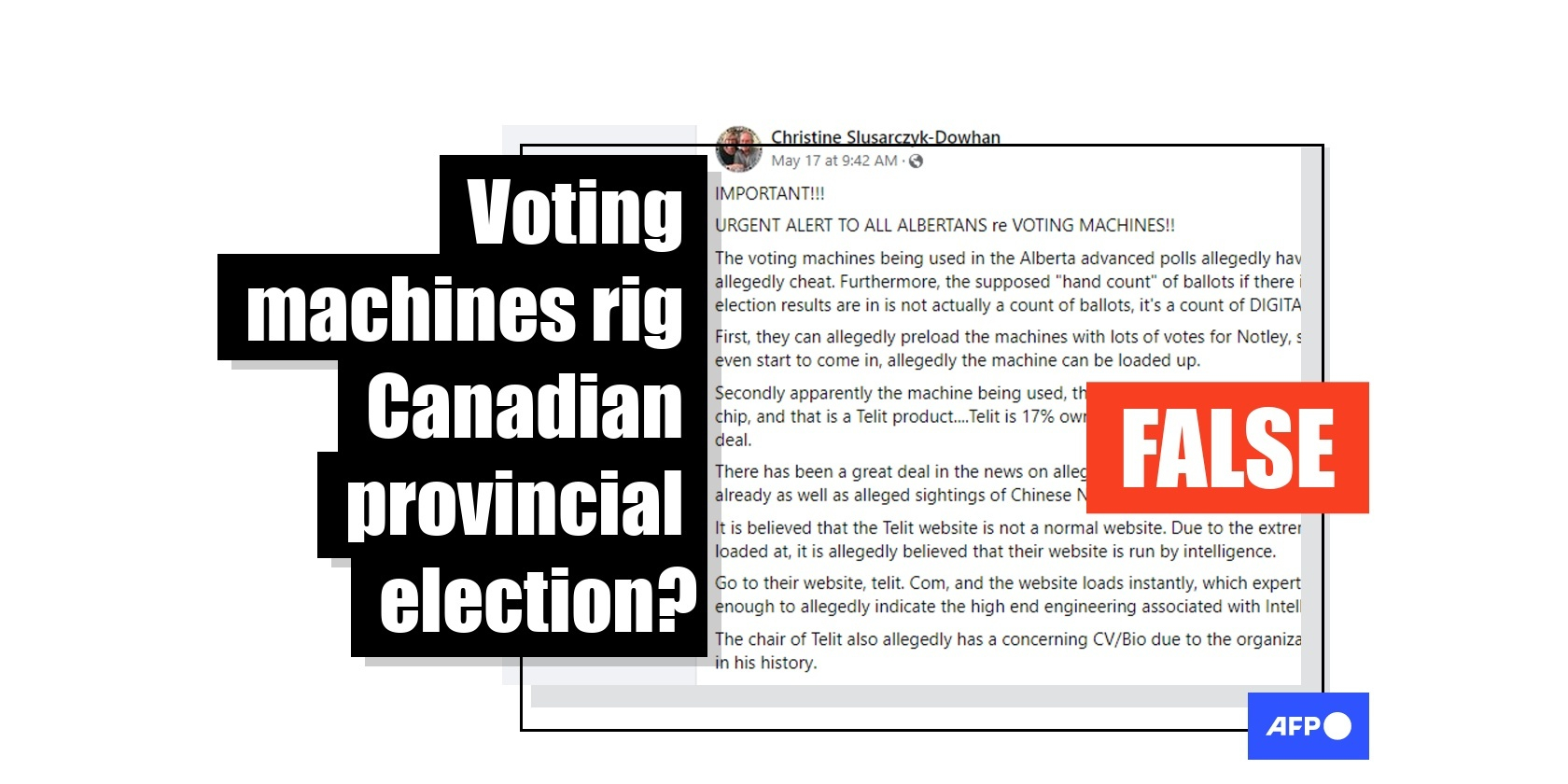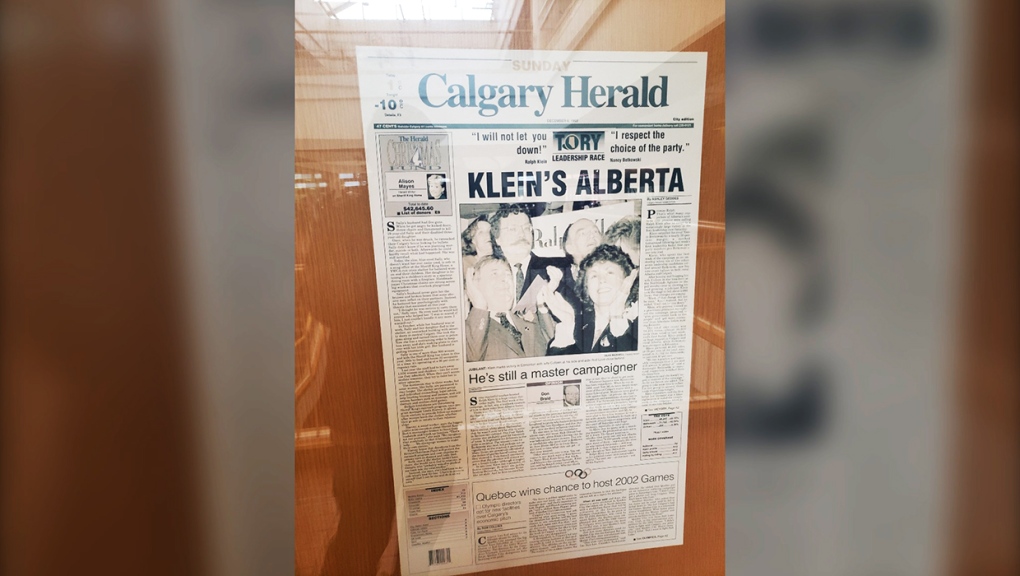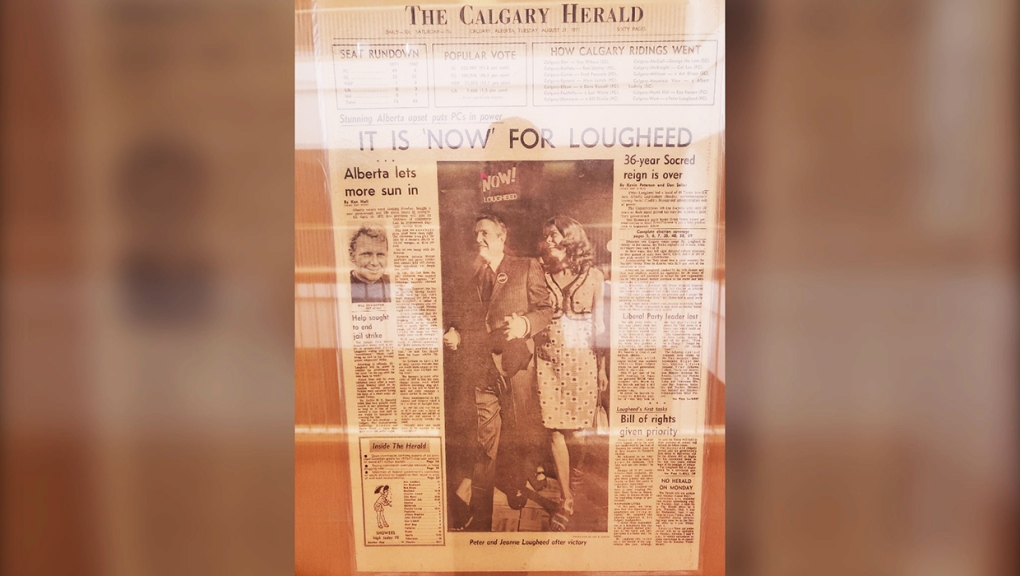Climate battle looms as Alberta premier Smith takes aim at Trudeau after election win
By Steve Scherer and Nia Williams
May 30 (Reuters) -Alberta's election of conservative leader Danielle Smith puts her on a collision course with Canada's Liberal Prime Minister Justin Trudeau over climate policies that she claims will underminethe province's massive fossil fuel industry.
Smith, leader of the United Conservative Party (UCP), defeated left-leaning New Democratic Party leader Rachel Notley on Monday, and immediately targeted Trudeau, threatening the country's ambitious climate goals.
Smith said Trudeau'sLiberal climate policies will destroy tens of thousands of jobs in the oil and gas sector, which contributes more than 20% to Alberta's gross domestic product.
Trudeau's government is aiming to cut climate-warming carbon emissions 40-45% by 2030, but will struggle to meet that target without significant reductions from Alberta, Canada's highest-polluting province.
Some analysts have said deep emissions cuts are not possible without cutting oilproduction, which Smith fiercely opposes.
In her victory speech in front of cheering supporters in Canada's oil capital Calgary, Smith called on Albertans to stand up against policies including the federal government's proposed oil and gas emissions cap and clean electricity regulations, expected to be unveiled within weeks.
"Hopefully the prime minister and his caucus are watching tonight," Smith said. "As premier I cannot under any circumstances allow these contemplated federal policies to be inflicted upon Albertans."
Canada has the world's third-largest oil reserves, most of which are held in northern Alberta's vast oil sands. The province produces around 80% of Canada's 4.9 million barrels per day of crude oil.
"Let's create more good jobs, grow our economy, and continue to position Alberta as a leader in clean energy," Trudeau said in a tweet on Tuesday congratulating Smith on her victory.
The federal government says Canada needs to cut emissions from oil and gas production to stay competitive as the world transitions to net-zero by 2050.
'BELLICOSE RHETORIC'
Since winning party leadership and becoming premier in October, Smith passed legislation allowing the province to refuse to enforce federal laws it deems unconstitutional, and she has threatened to use it on legislation seen as a potential threat to the province's energy industry.
Smith and Trudeau have also sparred over who should pay for potential increases to tax credits for carbon capture and storage (CCS) projects that the oil and gas wants to use to decarbonize its production process.
"One of the challenges is there is a political class in Alberta that has decided that anything to do with climate change is going to be bad for them or for Alberta," Trudeau told Reuters in a January interview.
However, some industry leaders seeking public sector funding for CCS are tiring of the combative relationship between the two levels of government and have called for better collaboration.
Earlier this year, Alex Pourbaix, the then-CEO of oil producer Cenovus Energy CVE.TO, said he would "like to see the temperature turned down a little bit".
For Trudeau, Smith may be a better political counterpoint than her less controversial rival Notley would have been, as the Liberals can cast her as a western version of federal Conservative Party leader Pierre Poilievre.
On Tuesday,Poilievre welcomed Smith's "resounding victory" and said Albertans had voted to "stand up for our energy sector and unleash the full potential of Alberta's economy".
That said, provincial leaders of all political stripes tend to work with the federal government when it is beneficial to their electorate, as has been the case recently with federal funding for healthcare and childcare.
"Danielle Smith is canny enough to know that she has to be able to work with Ottawa," said Shachi Kurl, president of pollster Angus Reid Institute.
"There is a lot of bellicose rhetoric that comes from the Western premiers sometimes... But at the end of the day, politically, it does none of them any good to not be able to work together."
Reporting by Steve Scherer and Nia Williams; Additional reporting by Ismail Shakil; Editing by Denny Thomas and Michael Perry
United Conservatives’ narrow Alberta win sets up conflict with Trudeau
Party leader and Alberta premier Danielle Smith used victory speech to attack the prime minister’s climate policies
Leyland Cecco in Toronto
Alberta’s United Conservatives have scraped a majority government, narrowly defeating the rival New Democrats in what proved to be the province’s closest ever election.
The triumph for incumbent premier Danielle Smith foreshadows more friction between the western province and Canada’s federal government on environmental regulation, with Smith using her victory speech to attack the climate policies of the prime minister, Justin Trudeau.
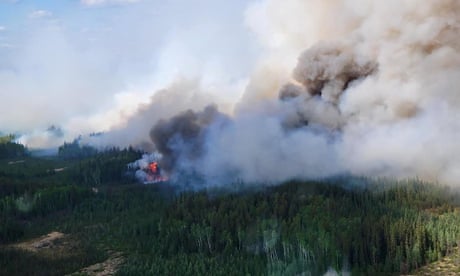
Alberta’s party leaders are ignoring the climate crisis while the region burns
Read more
The United Conservative party won 49 of the province’s 87 electoral districts in Monday’s vote, a figure that includes one candidate whom Smith has barred from joining the party’s caucus because of offensive remarks she made, comparing transgender students to feces.
The New Democratic party, under leader Rachel Notley, won the remaining 38 seats. Even though the NDP picked up more than a dozen seats, it fell short by razor-thin margins in the key battlegrounds.
Pollsters had predicted a tight race, but economist Blake Shaffer found voting results showed Notley’s NDP needed only 2,611 votes across six electoral districts to form a government. More than 1 million registered voters did not vote in the election, Shaffer said.
Taking the stage late on Monday, Smith told supporters she would fight Trudeau’s climate policies, arguing they would be harmful to the province’s largest industry and warning tens of thousands of jobs were at stake.
Trudeau’s government has pledged to cut carbon emissions by as much as 45% by 2030, a goal it is not yet on track to meet. To meet this goal, experts agree the oil industry would need to make steep cuts to its emissions.
“This is not a road we can afford to go down. If [Trudeau] persists, he will be hurting Canadians from coast to coast and he will strain the patience and goodwill of Albertans in an unprecedented fashion,” Smith said. “Hopefully the prime minister and his caucus are watching tonight … As premier, I cannot under any circumstances allow these contemplated federal policies to be inflicted upon Albertans. I simply can’t and I won’t.”
Smith has previously used the federal government as a useful political foe in the oil-rich province, where many residents are wary of aggressive climate goals. She and Trudeau have feuded over who is responsible for carbon capture and storage projects, as well as what a “just transition” from fossil fuels to renewable energy might look like.
Earlier this year, Smith’s government passed a controversial “sovereignty act” which allows the province to refuse to enforce federal laws it believes to be unconstitutional. Smith has previously warned it could be used on federal legislation that Alberta views as a potential threat to the province’s oil and gas industry.
“Let’s keep working together to deliver results for Albertans – let’s create more good jobs, grow our economy, and continue to position Alberta as a leader in clean energy,” Trudeau tweeted on Monday night, congratulating Smith for her win.
The Conservative leader, Pierre Poilievre, who endorsed Smith in the final days of the campaign, called it a “resounding win” and said Smith would help the province “unleash the full potential of Alberta’s economy”.
With such a narrow victory, Smith is likely to face internal challenges within her party. Her margin of victory was slim for a province where conservative premiers typically dominate general elections. Smith must also contend with a history of party mutiny: no conservative premier has been able to serve a full term in office since 2004. Instead, they fall victim to fierce infighting between factions of libertarians, populists and fiscal conservatives.
Notley, who served as premier from 2015 until 2019, fell short in her goal of recapturing the province’s leadership. Despite the loss, she vowed to lead her party into the next election.
“It is my honour to serve as your leader,” she said in her concession speech. “And it is my privilege to continue to serve as leader of the official opposition.”
Notley, whose tenure as centrist leader has become enmeshed in the party’s identity, will oversee the largest official opposition in Alberta’s history, a feat of political manoeuvring that has seen her grow the NDP from an also-ran party into a contender to threaten the conservative lock on the province.
Topics
"My fellow Albertans we need to come together no matter how we have voted to stand shoulder to shoulder against soon to be announced Ottawa policies that would significantly harm our provincial economy," Smith said. Trudeau's government is aiming to cut carbon emissions 40-45% by 2030, but will only be able to achieve its climate plan with significant reductions from Alberta, the highest-polluting province.
Reuters | Updated: 30-05-2023
Danielle Smith's United Conservative Party (UCP) won the Alberta provincial election on Monday, securing another four years in power in Canada's largest oil-producing region, and immediately fired a warning shot at Prime Minister Justin Trudeau over climate change. The UCP defeated Rachel Notley's left-leaning New Democratic Party (NDP) in a closely-fought election that focused on affordability and healthcare, but the UCP will return to the legislature with a diminished caucus.
Smith used her victory speech in Calgary to take aim at Trudeau. "My fellow Albertans we need to come together no matter how we have voted to stand shoulder to shoulder against soon-to-be-announced Ottawa policies that would significantly harm our provincial economy," Smith said.
Trudeau's government is aiming to cut carbon emissions 40-45% by 2030, but will only be able to achieve its climate plan with significant reductions from Alberta, the highest-polluting province. Alberta's oil sector produces the majority of Canada's 4.9 million barrels per day of crude.
Smith is fiercely opposed to a Liberal plan to cap oil and gas emissions, arguing it will lead to a production cut, and the federal goal of a net-zero electricity grid by 2035. She called on Trudeau to halt those climate policies, warning he would "strain the patience and goodwill of Canadians in an unprecedented fashion".
In a note published last week, BMO Capital Markets analyst Jared Dziuba said the UCP is committed to decarbonization, but at a slower pace and lower cost than the NDP would have been. Notley conceded defeat in a speech before supporters in Edmonton, in which she congratulated Smith and noted the NDP would add at least 10 new lawmakers and form one of the largest official oppositions in Alberta's history.
"Now although we did not achieve the outcome that we wanted but we did take a major step towards it," Notley said. Tallying the votes took much longer than usual, with the result being called by television networks more than three hours after polls closed. Elections Alberta, the official body responsible for administering the election, said some voting locations closed late to accommodate all voters in line.
Report Ad
UCP supporters were undeterred by a series of controversies since Smith became premier in October, including a report from Alberta's ethics commissioner this month that said the premier breached conflict of interest rules by discussing a pandemic-related prosecution case with her justice minister. The UCP's victory also cements a shift to the right in Alberta politics. The western province has traditionally been a bastion of conservativism but Smith also garnered support from a growing Alberta populist movement spurred on by opposition to pandemic-era public health restrictions and distrust of the federal government in Ottawa.
Her government will be bolstered by robust oil prices that are enabling Alberta to pocket record resource revenues. Even so, provincial unemployment at 5.9% sits above the Canadian average of 5%, which is partly a hangover from the energy sector downsizing during the 2014-15 oil price crash, and the healthcare system is under strain. During the election campaign the UCP promised to enact a law guaranteeing governments cannot raise personal or income taxes without approval from Albertans in a referendum.
The government is also looking into policies like Alberta leaving the Canadian Pension Plan, which all Canadians have to pay into, and replacing the national Royal Canadian Mounted Police with a provincial force.
Danielle Smith's UCP Wins Majority In Alberta
Danielle Smith's United Conservative Party will return to government with a diminished but secure majority in the Alberta Legislature.
by Alex Cosh
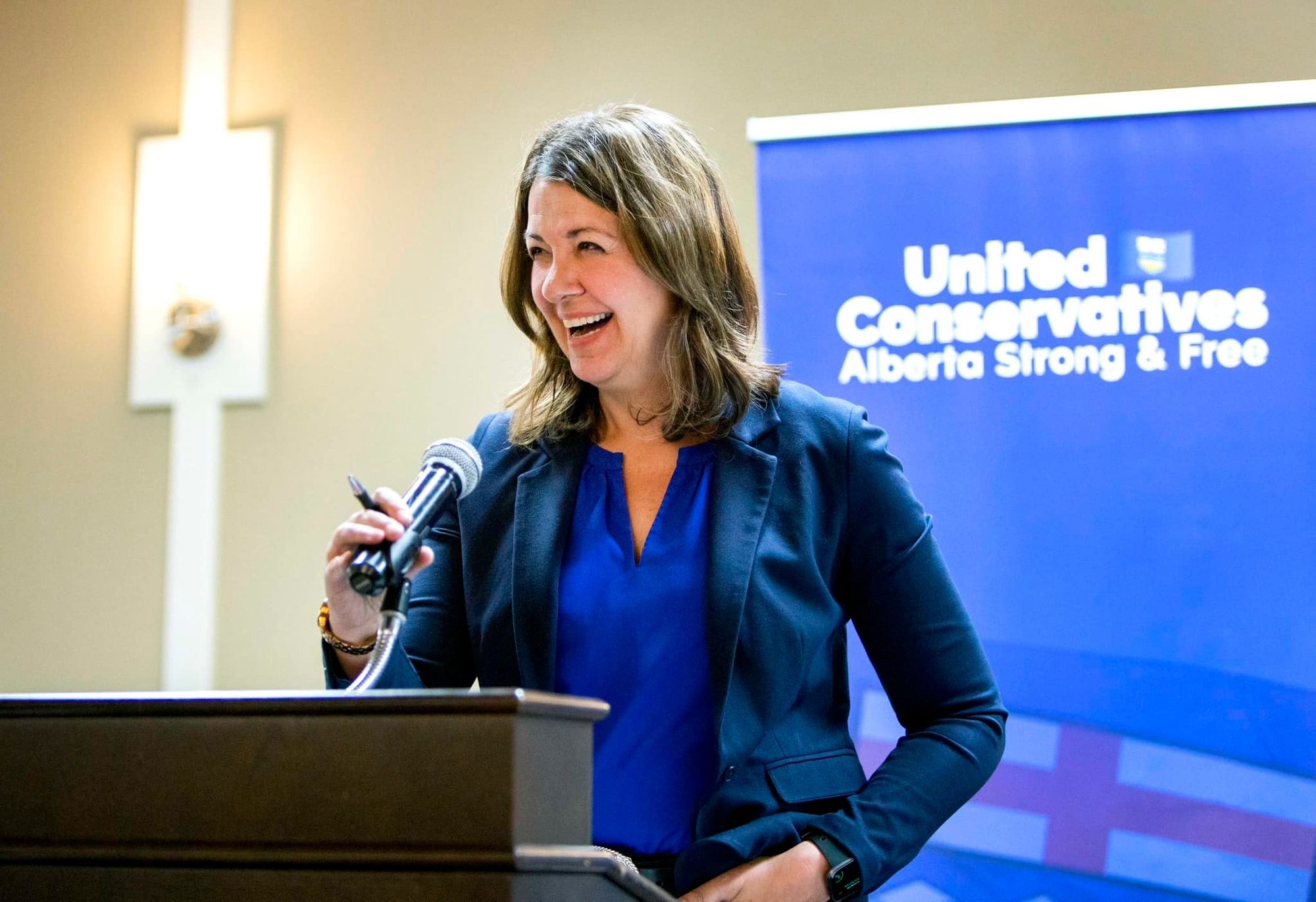
Danielle Smith's United Conservative Party will return to government with a diminished but secure majority in the Alberta Legislature.
Despite being projected to lose 14 seats when compared with the 2019 election, including a handful of those held by key cabinet ministers, the UCP are on track to secure 49 seats compared to the Alberta NDP's 37 at the time of writing. Several ridings in Calgary remained extremely close late into the night.
The campaign saw Smith grappling with backlash against extremist comments she made in the months and years before she became UCP leader last fall. These comments included comparing those who took COVID-19 vaccines to followers of Adolf Hitler and proposing a plan to sell off Alberta's major hospitals to for-profit operators.
Her party's election platform ultimately resembled a run-of-the-mill conservative offering, including tax cuts and heavy handed "law and order" policies. The platform contained no mention of Smith's signature "Sovereignty Act," a piece of legislation lambasted by critics last December as undemocratic and unconstitutional.
Rachel Notley's NDP, meanwhile, explicitly tried to court conservative voters disaffected by Smith's far-right political history, and pitched right-leaning fiscal policies like eliminating the province's "small business" tax and promising to maintain the lowest corporate tax rate in Canada (despite a proposed three per cent increase). The NDP secured endorsements from two high-profile former Progressive Conservative ministers on the basis of Smith's extremist views.
The NDP also tried to focus the election campaign on healthcare, promising to undertake a major recruitment drive of health professionals to address wait lists.
Ultimately, the NDP's rightward tack on economic policy failed to deliver sufficient gains, particularly in Calgary, which had been dubbed the election's key battleground. As predicted, the NDP swept Edmonton, the provincial capital, while the UCP overwhelmingly dominated rural areas.
Conspicuously absent from both parties' campaigns was a focus on the climate crisis, despite wildfires raging across the province throughout much of the election period.
In her victory speech, Smith opened by taking swipes at pro-NDP third-party campaign groups (she did not name any names) but said she wanted to put partisanship and "personal attacks" aside.
"My oath is to serve all Albertans no matter how you voted," she said. "I will work every day to listen and to improve on the issues you care about."
Smith then attacked the Trudeau government, taking particular aim at Ottawa's plans to cap emissions in the oil and gas sector, and to introduce a net-zero electricity grid by 2035.
Speaking to NDP supporters late last night, Notley said she would continue serving as leader of the opposition, despite acknowledging her party's disappointment at the results.
The Canadian Press
Tue, May 30, 2023
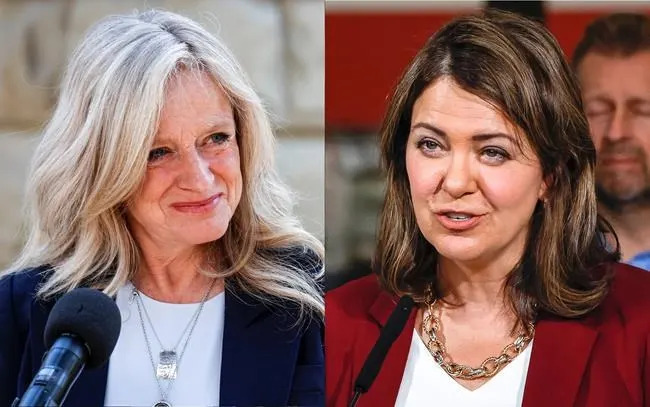
Alberta’s United Conservative Party emerged bloodied but still standing in Monday’s bitterly contested provincial election.
Danielle Smith’s UCP dominated outside Alberta’s two largest cities while retaining enough support in Calgary to overcome an NDP sweep in Edmonton and win a second consecutive majority government.
"To paraphrase our dear friend (former Alberta premier) Ralph Klein, welcome to another miracle on the Prairies,” Smith told cheering supporters on the Calgary Stampede grounds.
Smith thanked the hundreds of thousands of Albertans who voted UCP, but also addressed those who did not.
"Though I didn’t do enough in your judgment to win your support in this election, I will work every day to listen, to improve and to demonstrate to you that I can be trusted to improve on the issues you care so deeply about.”
The UCP were winning or elected in 49 seats to 38 for Rachel Notley’s NDP in the 87-seat legislature, but a final tally was unknown early Tuesday given close races in Calgary.
The change represents a 13-seat swing compared to the 63-24 vote split between the two parties in 2019.
It was an election night beset by slow reporting from Elections Alberta. Only a small fraction of results were available 90 minutes after polls closed and a UCP win wasn’t called for another 90 minutes after that.
Smith easily won her seat in Brooks-Medicine Hat, as did Notley in Edmonton-Strathcona.
Notley told supporters at a downtown Edmonton hotel she will stay on as leader and harness the power of the largest official Opposition in the province’s history.
“We will continue to speak up on behalf of Albertans who struggle to have their voice heard. We will fight for better health care, better education, better jobs," Notley said.
"And, my friends, we will be unequivocal in our demand for respect for the rule of law and an unqualified belief in human rights and basic dignity.”
Support for third parties, such as the centrist Alberta Party, fell away as voters concentrated on either supporting or defeating the two main contenders.
There were 758,550 votes cast in advance polling, smashing the previous record of 700,746 in 2019.
It was the second victory in seven months for the 52-year-old Smith. She had been out of politics for seven years, working mainly as Calgary-based radio talk-show host and political pundit.
Key cabinet ministers retained their seats, including Adriana LaGrange (Education), Rebecca Schulz (Municipal Affairs), Nate Horner (Agriculture), Rick Wilson (Indigenous Relations) and Nathan Neudorf (deputy premier and Infrastructure).
However, Jason Copping, who was health minister, was defeated in Calgary-Varsity as were Nicholas Milliken, the minister for mental health and addiction, in Calgary-Currie, and deputy premier Kaycee Madu in Edmonton-South West.
Justice Minster Tyler Shandro was losing by seven votes as of early Tuesday to NDP challenger Diana Batten in Calgary-Acadia.
Smith ran on a platform of fighting crime and lowering personal income taxes in what is already the lowest-taxed jurisdiction in Canada. She promised a bill forbidding any future hikes to corporate or personal income taxes without a referendum.
She also aimed to woo voters in Calgary by announcing, on the eve of the race, a $330-million provincial contribution to a $1.2-billion deal with the city and the owners of the Calgary Flames for a new NHL arena.
The NDP dominated in Edmonton, a city in which they won all but one seat in 2019.
The three Calgary NDP incumbents — Kathleen Ganley, Irfan Sabir and Joe Ceci — were all re-elected, as were stalwarts Sarah Hoffman, Shannon Phillips and Heather Sweet.
Jennifer Johnson was the winning UCP candidate in Lacombe-Ponoka, but her future wasn’t clear.
During the campaign, Johnson apologized for comments she made last year comparing transgender students to feces. Smith has said Johnson would not sit in the UCP caucus because of the remarks but later, when asked about Johnson, said she believes in redemption and second chances.
The vote capped a bitter campaign that began even before the writs were issued May 1. Both parties warned the other could not be trusted with the economy or with fixing a health system plagued by long surgical waits, teeming emergency wards and a shortage of family doctors.
Smith was dogged by a litany of comments and actions — past and present — that moved the party further to the political right while alienating moderates and prompting some former Progressive Conservatives to announce they were parking their vote with the NDP.
Smith had compared the COVID-19 vaccinated to followers of Adolf Hitler. And two weeks ago, Alberta’s ethics commissioner concluded Smith breached a fundamental democratic firewall earlier this year by leaning on her justice minister, unsuccessfully, to drop the criminal case against a COVID-19 protester.
Smith also refused to disavow comments from her pundit days that she would like to see patients pay out of pocket for some medically necessary services in order to keep the system sustainable. However, she promised on the campaign trail that she would respect the sanctity of medicare.
She also promised to revisit, after the election, proposals such as abandoning the RCMP for a provincial police force and pulling out of the Canada Pension Plan.
There are questions around what role a growing faction within the party called Take Back Alberta will have with Smith’s government.
The fundamentalist libertarian movement has links to last year’s protest against COVID-19 restrictions that blocked the main United States border crossing at Coutts, Alta., for two weeks. The group successfully backed a slate that forms half the UCP governing board with plans later this year to take over the other half.
Smith, the former leader of the Wildrose Party, won the UCP leadership in October, capitalizing on broad party resentment toward then-leader Jason Kenney, Prime Minister Justin Trudeau and COVID-19 health rules.
The win was a vindication for Smith, after presiding over two of the biggest debacles in recent Alberta conservative history that long made her persona non grata within the movement.
In 2012, Smith’s Wildrose saw a late election polling lead evaporate after she questioned the science of climate change and refused to sanction candidates for intolerant remarks, including one who called on gay people to repent or face eternal suffering in hell’s “lake of fire.”
In 2014, Smith tried to unite the fractured conservative movement by leading a mass floor crossing of her Opposition Wildrose to the governing Progressive Conservatives.
The Wildrose and PCs joined forces to create the UCP in 2017 and, led by Kenney, defeated the NDP in the 2019 election.
This report by The Canadian Press was first published May 29, 2023.
— With files from Ritika Dubey and Angela Amato in Edmonton and Bill Graveland and Colette Derworiz in Calgary.
Dean Bennett, The Canadian Press
What Danielle Smith’s Alberta election win means for the rest of Canada
 On Monday night, voters will either give the sitting premier a mandate, or return a former premier to office. But how did we get here? From floor crossings to the 2015 Orange crush, Scott Roberts looks back at the political histories of Danielle Smith and Rachel Notley.
On Monday night, voters will either give the sitting premier a mandate, or return a former premier to office. But how did we get here? From floor crossings to the 2015 Orange crush, Scott Roberts looks back at the political histories of Danielle Smith and Rachel Notley.Indeed, all eyes will be on Alberta as Smith begins her second term, which political watchers say will have implications not just for the province but for the rest of Canada as well.
Alberta has always had a testy relationship with the federal government and even other provinces as it defends its profitable energy industry and other interests.
But the past four years under the United Conservative Party and during the COVID-19 pandemic have seen Edmonton’s relations with Ottawa grow particularly tempestuous.
The question now is whether a fresh start is on the horizon — though experts have doubts.
“It’s gospel that the federal government ignores Alberta, and to a degree that is correct,” said Allan Tupper, a political science professor at the University of British Columbia who spent decades teaching in Alberta. “There’s a great deal of resentment.”
“At the end of the day, (Smith) has to recognize that she has to deal with the federal government. No matter what kinds of laws she passes, provinces have to work with Ottawa.”
Global News and others projected a Smith victory Monday night after a race beset by slow tabulations. It was a race that saw both Smith and Notley trying to frame themselves as someone voters could trust.
It remains to be seen whether Smith continues to pursue the often-tense approach with Ottawa she demonstrated during her short premiership. Her government passed the controversial Alberta sovereignty act and openly mulled opting out of the Canada Pension Plan and replacing it with a provincial version.
None of those proposals were part of the UCP platform during the campaign, and it still remains to be seen what will happen when or if Smith’s government invokes the sovereignty act — a move that would likely spark court challenges.
The Onion Creek First Nation in Alberta has already sued to block the legislation, claiming the government did not consult with Indigenous groups. Smith launched Indigenous consultations after the act was passed.
If Smith moves forward with pursuing a provincial pension plan or other similar moves, experts say that could hurt efforts between Ottawa and the provinces to work together on solving national issues, like health-care funding earlier this year.
“I think there are questions about how Canada and the federation can work together when there seems to be some political advantage to be gained by attacking the federal government and provinces with which they disagree,” said Lori Williams, a political science professor at Calgary’s Mount Royal University.
One area where Smith will be likely to butt heads with Trudeau is climate. The premier has decried the Liberal government’s “Sustainable Jobs Plan” to move Canada’s economy away from fossil fuels toward renewable energy while ensuring oil and gas workers are trained for the jobs of the future.
Smith has pushed for Alberta to be exempted from the plan, arguing it fails to recognize Alberta’s right to develop its own natural resources and manage its workforce.
Smith has also criticized Ottawa’s carbon tax and its goal to cut emissions 40 to 45 per cent below 2005 levels by the end of this decade, as well as a net-zero electricity grid by 2035.
Alberta’s energy sector has already taken steps to reduce emissions and adopt measures like carbon capture and other technological advancements. Experts believe local and outside investors will want a premier who supports the oil and gas industry by standing up for its own environmental measures, rather than clinging to a reliance on fossil fuels.
“Striking that balance … strategically just makes more sense,” Williams said. “I’ve never understood why Jason Kenney, now Danielle Smith, think (supporting oil and gas while fighting climate action) is a winner long-term beyond energizing their base.”
During her victory speech Monday night, Smith urged Trudeau and his government to work collaboratively with Alberta to develop a “meaningful” climate strategy that won’t adversely impact jobs or revenues in the province.
She warned incoming federal policies will hurt Canadians across the country and “strain the patience and goodwill of Albertans.”
“When Canadians work together, there’s no challenge that we can’t overcome. I believe that, but it takes two parties acting in good faith to achieve that meaningful partnership,” she said.
“Alberta is willing to be that partner, and we need our federal government to show it is willing to partner in good faith as well, and now is the time to do so. We are waiting.”
One person who will be watching Smith’s victory and performance moving forward will be federal Conservative Leader Pierre Poilievre. Like Smith, he has tapped into voter resentment of Trudeau’s Liberals while seeking to expand his base.
While Poilievre will likely be encouraged to see Smith retain her premiership, it’s not yet clear if his endorsement of her could hurt him when his party faces more moderate swing voters in Ontario and Quebec, whose votes he will need to become prime minister.
Until the next federal election, what Smith’s victory means is likely more political friction between Alberta and Ottawa — not to mention, the possibility she will be forced out of party leadership just as her predecessor Kenney was.
In a recording of a Take Back Alberta meeting earlier this month, canvasser recruiters were heard urging supporters to convince voters to support the UCP despite their concerns about Smith, suggesting the premier could either be reasoned with or ousted down the road.
Political strategist Stephen Carter, who has plenty of campaign experience in Alberta, told Global News that strategy is a bad one.
“‘Don’t worry, I’ll get rid of my boss’ is generally not a great starting position in politics,” Carter said.
For now, despite evidence to the contrary, the hope will be Smith and Ottawa can reset their relationship and move forward with, as Smith put it Monday night, “good faith.”
“The country does not want constant friction with Alberta, and I think broadly speaking, at the end of the day, neither does Alberta,” Tupper said.
— with files from Global’s Saif Kaisar and the Canadian Press
The United Conservatives lost several key seats in Calgary but maintained a hold on the city
Author of the article: Jason Herring
Published May 29, 2023
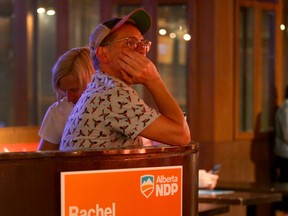
The United Conservatives lost numerous key seats in Calgary but maintained enough seats in the hotly contested battleground to secure a majority government in Monday night’s Alberta election.
When the dust settled on the election early Tuesday morning, Danielle Smith’s UCP had won 12 out of Calgary’s 26 constituencies, while Rachel Notley’s NDP triumphed in 14 ridings.
The split result in Calgary is the culmination of a campaign which saw the bulk of electioneering take place in Alberta’s largest city. Parties, pundits and pollsters had predicted Calgary would hold the balance of the election, with the NDP slated to win Edmonton and the UCP taking much of rural Alberta, a forecast which held true Monday.
Though they won the election, the night brought several big losses for the UCP in Calgary, as several incumbents fell in their bids to return to the legislature.
Those defeats include prominent cabinet ministers Jason Copping, Jeremy Nixon, Jason Luan and Nicholas Millikan.
And Tyler Shandro was behind in Calgary-Acadia by a razor-thin margin, with the former health minister and justice minister trailing behind the NDP’s Diane Batten by only seven points. A judicial recount is expected to be triggered for that riding. NDP candidate Nagwan Al-Guneid’s 31-vote win over UCP incumbent Whitney Issik in the neighbouring Calgary-Glenmore also lands in recount territory.
Both parties and their leaders spent the vast majority of their election campaign within Calgary’s city limits, pitching residents their vision for the future of the city and province.
UCP Calgary-Shaw candidate Rebecca Schulz retained her seat. She said at the UCP’s election-night party prior to final results that she was feeling optimistic.
“And I mean tonight, seeing the momentum, I think others are feeling that as well,” Schulz said.
“I’m just so grateful for those people that put their trust in us and are out there putting in the hard work to hopefully see a re-elected United Conservative government.”
At the NDP’s Calgary headquarters Monday night, Calgary-Buffalo candidate Joe Ceci said he was feeling good despite some early tallies suggesting a UCP lead. He says it’s been a “marvellous” campaign.
“It used to be blue, blue, blue, here in (Calgary) and we’ve changed that,” he said. “I had so many people say I can’t believe the number of orange signs that are in this city. It’s invigorating. It’s enlightening to kind of feel that there’s support behind every door.”
The UCP’s biggest pledge for Calgary came before the campaign even began, when they promised $330 million to pay for infrastructure costs needed to get the new arena deal for the Calgary Flames across the finish line. Smith has said her government will give final approval for that funding after the election.
Prior to the election, the UCP held 23 Calgary seats, while only three NDP MLAs represented the city.
A slow trickle of vote reporting meant it was unclear for much of the night which party had won in the city.
Despite the sluggish reporting, Elections Alberta said in a statement to Postmedia there were no problems with vote counting.
Please see the Twitter thread below for further updates on results in Calgary:
— With files from Michael Rodriguez and Matthew Black
jherring@postmedia.com
Nia Williams
Published May 29, 2023
Voters in Canada’s main oil-producing province Alberta head to the polls on Monday in a tight election race that is expected to have a significant bearing on Prime Minister Justin Trudeau’s climate goals, which are already seen as lagging global peers.
The battle between populist Premier Danielle Smith’s United Conservative Party (UCP), which is seeking a second consecutive term, and Rachel Notley’s left-leaning New Democratic Party (NDP) is expected to be extremely close, pollsters say, even though Alberta is traditionally a conservative bastion.
The result could reshape Trudeau’s climate agenda if the UCP wins, making it harder for Canada to meet its goal of cutting emissions 40-45% below 2005 levels by the end of this decade.
Smith is opposed to many of Trudeau’s policies including an oil and gas emissions cap and a net-zero electricity grid by 2035, arguing they will hurt an energy sector that contributes more than 20% to Alberta’s GDP.
Notley’s NDP, which ruled from 2015 to 2019 after a shock election victory that ended decades of conservative rule in the province, is seen as more amenable to Liberal plans to rapidly cut emissions, although it also opposes the oil and gas emissions cap.
Alberta is Canada’s highest-emitting province, largely due to vast oil sands operations in the northern boreal forest and produces 80% of the country’s 4.9 million barrels per day of crude oil.
BMO Capital Markets analyst Jared Dziuba said both parties are committed to decarbonization, but the pace and costs of the effort vary.
“We see the likely outcome of an NDP victory as (possibly) accelerated decarbonization, but potentially at much higher net costs to industry given its position on environment and taxes,” Dziuba wrote in a note to clients, adding the UCP would likely support a steady pace of progress at a lower cost.
The latest survey from polling firm Leger shows the right-wing UCP slightly ahead province-wide, backed by 49% of decided voters versus 46% for NDP. However, the NDP holds a modest lead in Alberta’s corporate oil capital Calgary, a key battleground where a number of seats could go to either party, according to a poll from ThinkHQ Public Affairs.
Both leaders held rallies in the city over the weekend.
“I will never permit any Liberal Prime Minister or any Ottawa politician to phase out our energy industry or the jobs of our amazing energy workers,” Smith said in a speech on Friday that included pledges to grow the economy and make the cost of living more affordable.
Notley addressed supporters in Calgary on Saturday and defended her party’s record on jobs, healthcare and reducing childhood poverty. She held another major rally in NDP stronghold and Alberta capital Edmonton on Sunday
In the wake of the COVID-19 pandemic, healthcare has become a big issue in Alberta, while affordability has emerged as another key voter concern due to inflation.
Polls are open from 9 a.m. to 8 p.m. local time and the result is expected to be called late Monday night.
A victory for Smith would cement a rightward shift in the province. Since becoming UCP leader in October, Smith has pushed back against perceived federal government over-reach and passed the Alberta Sovereignty Act that gives the province the power to ignore federal laws it deems unconstitutional.
She has also been dogged by a string of controversies largely related to her opposition to COVID-19 vaccine mandates.
(Reporting by Nia Williams Editing by Denny Thomas and Deepa Babington)
A year ago, it looked like Rachel Notley's race to lose. Danielle Smith has caught up in high-drama, low-issue battle
Author of the article:Tyler Dawson
Published May 29, 2023 •
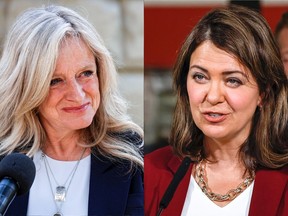
EDMONTON — Whoever wins the Alberta election on Monday, it will be one of the strangest campaigns ever fought in the province, with plenty of drama but few policy issues, and the real possibility of the closest outcome in Alberta political history.
In 2015, when the NDP won, it was the reversal of 40 years of conservative rule, aided by vote-splitting and a voting public whose patience was at an end. In 2019, when the United Conservatives won, it was a massive victory, featuring a re-energized right-wing movement looking to revitalize the province’s economy.
But this time, with the two parties neck-and-neck as voting day approaches, the election is not about jobs or pipelines or even party platforms.
It’s about Rachel Notley, leader of the NDP, and Danielle Smith, leader of the United Conservative Party.

Licia Corbella: Rachel Notley can't run on her record as premier because it's a disaster
“This race, [has] become presidential, presidentialized…people are not going to say, ‘Am I voting UCP or NDP?’ They’re like, ‘Do I want Rachel Notley as my premier or do I want Danielle Smith as my premier?’ And I think that’s a very different question,” said Ken Boessenkool, a staunch Smith critic, longtime conservative strategist and policy adviser with Meredith & Boessenkool.
Issues have surfaced, none of them campaign-defining. The NDP has hammered away on health care. They’ve promised a recruitment strategy for doctors and nurses, and repeatedly raised the spectre of private medicine, which is actually part of the UCP’s handbook. It’s an issue the NDP poll better on than the UCP.
And the UCP have talked extensively about the economy. Former prime minister Stephen Harper even put out a video early in the campaign warning about the economic damage he believes the NDP would do if they were re-elected. The UCP polls well on the economy.
“It’s been a very low issue-profile campaign,” said Evan Menzies, formerly director of communications for the UCP, now with Crestview Strategies in Calgary. “The thing that makes this campaign very complex is the fact that we have an incumbent premier, (and) we have a former premier contesting it. So, Albertans really are looking at sort of two records in office and saying, ‘Which is the record that I prefer?’”
Albertans seem to put Smith and Notley in a dead heat in terms of who they like more: 39 per cent have a positive view of Notley, 38 per cent have a positive view of Smith. The numbers are equally tight for those who dislike Notley (46 per cent) and Smith (47 per cent), per recent Abacus Data polling.
Six months, a year ago, it looked like Notley’s race to lose. The NDP had good polling numbers, and Notley was well-liked. The party out-fundraised their opponents and was flush with cash.
The UCP, an alliance of two different Alberta conservative traditions, was supposed to end vote-splitting and guarantee conservative rule for another generation. Yet, amidst the pandemic and intense economic fluctuations, it spent considerable time absorbed in internecine quarrelling.
After Jason Kenney quit the UCP, a leadership campaign last summer saw the party’s right edge emerge victorious, with Smith taking the helm in a narrow victory. By the time the UCP held its convention last fall, the party was united to defeat Notley’s NDP.
The latest polling — the bulk of it from Mainstreet Research — shows the United Conservatives with a modest lead. On May 25, the pollster reported 46 per cent of Albertans planned to cast a ballot for the UCP, and 42 per cent for the NDP, with seven per cent still undecided, and the remainder scattered between small parties.
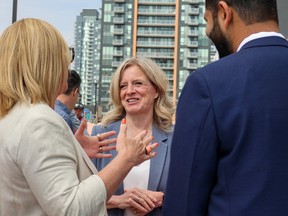
“The fact that the NDP are even close is already an indictment of the Danielle Smith era of the UCP,” said Boessenkool. “There’s no way that any party should be close to a united conservative tent.”
At least part of the reason has been the “bozo eruptions.” In a country where an impropriety or an inelegant comment has been enough to end a political career — and scuppered Smith’s last crack at becoming premier in 2012 — the UCP has largely kept its candidates while dealing with a steady drip of controversy.
“I think these things will affect turnout: they’ll hurt UCP turnout and they’ll boost NDP turnout,” said Boessenkool.
Jennifer Johnson, a nurse and farmer who lives near the central Alberta town of Bentley, was the UCP candidate for Lacombe-Ponoka, at least until audio of her comparing transgender children in the classroom to feces in cookie dough leaked out. She’s still technically on the ballot — it was too late to remove her — but Smith said she won’t sit in caucus.
Christine Myatt, who worked for Kenney and is now with New West Public Affairs, said the UCP has done a good job of “neutralizing the attacks.”
“(They’re) focusing on the UCP’s record on the economy, and really sowing equal doubt in the minds of voters about ‘do you want to go back to to a Rachel Notley-led government,'” Myatt said.
For most of her career in media and politics, Smith has operated on something of the political fringe; the libertarian wing of Alberta politics. As recently as June 2021, Smith argued in a position paper that out-of-pocket payments would be necessary to sustain the health-care system, and in October 2021, suggested selling off several Alberta hospitals. Those positions have been repeated ad nauseam by her NDP opponents, and Smith has had to swear, repeatedly, she doesn’t stand by her previous comments.
Smith also famously embraced fringe positions during the pandemic. She supported the border blockade in Coutts, Alta., and vowed to seek “amnesty” for those who faced charges for violating COVID-19 public-health rules. She said the unvaccinated were the “most discriminated against” group she had seen in her lifetime. And she stopped wearing a poppy on Remembrance Day because of the way politicians tackled COVID
Additionally, she promoted hydroxychloroquine, an anti-malarial drug, as a “100 per cent” effective treatment for COVID-19, and herself took Ivermectin — an anti-parasitic drug — when she came down with COVID-19, picking up the drug on the same day the College of Physicians and Surgeons of Alberta said it should never be prescribed to treat the viral infection.
While all of this featured prominently in the attacks against Smith during the campaign, the latest bombshell was the finding by Marguerite Trussler, Alberta’s ethics commissioner, that Smith violated the Conflict of Interest Act when she lobbied Tyler Shandro, her justice minister, to intervene regarding charges against Artur Pawlowski, a Calgary street preacher, who has now started his own party to the right of the UCP.
Trussler compared Smith’s actions to those of Prime Minister Justin Trudeau during the SNC-Lavalin affair. “In the whole scheme of things, it is a threat to democracy to interfere with the administration of justice,” Trussler wrote.
Again, the report didn’t seem to move voters. At least part of the explanation, said Menzies, is that everyone knew the report was coming and anticipated it wouldn’t exonerate Smith. It was already baked in with voters, Menzies said.
What NDP candidate drama there has been has made even less of a mark.

The UCP mentions in its campaign advertising that Notley once said Alberta risked being Canada’s “embarrassing cousin” if it didn’t get its environmental record under control. And that Sarah Hoffman, former NDP deputy premier, once called Wildrose supporters “sewer rats.” Campaign literature in Edmonton details “anti-police” NDP candidates, too, but none of it seems to have broken into the popular discourse.
“I think voters kind of look past the noise now,” said Menzies.
On May 18, Rachel Notley and Danielle Smith faced off in a one-on-one leaders debate. It was just hours after Trussler had released her report. The UCP had crowed victory, as Trussler also said that she could find no evidence that Smith had contacted Crown prosecutors directly regarding COVID prosecutions, a central allegation the CBC had been reporting that the NDP had seized on.
In the debate, Notley seemed unable to land a decisive punch on the topic. “You were found to have broken the law in order to interfere with the system of justice to assist with somebody who had been charged with attempting to get people to commit violence against police officers,” said Notley.
“Ms. Notley, the NDP and the CBC lied for months saying I was calling Crown prosecutors and my staff were calling Crown prosecutors and it wasn’t true, and that is what the ethics commissioner found,” Smith responded.
For Smith, the debate was a strong showing. Perhaps her best day on the campaign.
“The NDP has had a full campaign of draws and the UCP has had a full campaign of losses, with one draw,” said Boessenkool.
Anecdotal evidence from those working the doors around the province for the NDP suggests voters do care about some of the scandals.
“They’re saying, ‘this is not the brand of conservatism that I grew up with,'” said Deron Bilous, a former cabinet minister under Notley, who’s now with Counsel Public Affairs, and has been volunteering with the NDP.
There have been some high-profile defections from conservative camps, who aren’t voting blue this time.
There's no way that any party should be close to a united conservative tent
Doug Griffiths, who served as a cabinet minister under former Progressive Conservative premier Ed Stelmach, said he’d be giving his vote to the New Democrat in Fort Saskatchewan-Vegreville, a suburban and rural riding east of Edmonton.
“I don’t believe the UCP party is conservative anymore,” Griffiths said in a video. “They are conspiratorial, they are feeding anger. They are anti-science, anti-truth, anti-fact.”
And, Jim Foster, who was attorney general in the 1970s under PC premier Peter Lougheed, argued that Smith’s ethics breach may actually warrant criminal charges, and that he’d be voting New Democrat in his home of Red Deer.
“I’m a lifelong conservative both federally and provincially, and this is a big change for me to abandon my party, but I simply cannot any longer tolerate this,” Foster told the Calgary Herald.
“The vast majority of conservatives who are nervous about Danielle are ultimately going to wind up supporting her,” Myatt predicted.
The tight popular vote polling doesn’t break down cleanly in terms of seat count, which are weighted towards Calgary and small-town Alberta — conservative heartlands. There are 87 seats in the Alberta legislature, 20 of them in Edmonton, 26 in Calgary and 41 in the rest of the province.
Throughout the campaign, the NDP has enjoyed a solid lead in Edmonton. Abacus Data’s most recent polling, released a week before voting day, showed 61 per cent of Edmontonians planned to vote NDP, with 27 per cent saying they’ll vote UCP. The race in Calgary is far tighter: 42 per cent said they’d vote NDP, and 47 per cent UCP. The gap is wide in favour of the UCP in the rest of the province, at 59 per cent UCP to 28 per cent NDP.
On Monday, it may come down to who can get people out the door and to the polling stations.
“The only thing left to do is to motivate and mobilize your supporters to get to the polls,” said Leah Ward, Notley’s former communications director, now with Wellington Advocacy. “There’s very little persuading left to do.”
• Email: tdawson@postmedia.com | Twitter: tylerrdawson
An election in Alberta will be a test of a premier who has said that she models her politics after those of prominent right-wing U.S. politicians.
By Ian Austen
THE NEW YORK TIMES
Ian Austen traveled to Calgary, Alberta and through the province’s south to report on the election
May 29, 2023
Voters in Alberta, the epicenter of conservative politics in Canada, will select a new provincial government on Monday.
Albertans will vote for local representatives in the provincial legislature and the party that wins the most seats will form the government, with its leader becoming premier.
The election pits the United Conservative Party, led by the current premier, Danielle Smith, against a leftist party, the New Democratic Party, led by Rachel Notley, a lawyer.
Before the pandemic, the governing United Conservative Party appeared to have a firm hold on power. But last year, large and angry demonstrations against pandemic restrictions and against vaccine mandates helped spark a trucker convoy in the province that eventually spread, paralyzing Ottawa, Canada’s capital, and blocking vital cross-border crossings.
A small group of social conservatives within the United Conservatives ousted their leader, Jason Kenney, ending his premiership, after the government refused to lift pandemic measures.
The party replaced him with Ms. Smith, a far-right former radio talk show host and newspaper columnist prone to incendiary comments; she compared people who were vaccinated against Covid-19 to supporters of Hitler.

The Background
Ms. Smith likes to extol right-wing U.S. politicians, for example, calling Gov. Ron DeSantis of Florida, a Republican running for president, her hero.
She also has floated ideas that most Canadians would never support, like charging fees for public health care.
Ms. Smith now finds herself, analysts say, far to the right of many conservative loyalists, turning what should been a near-certain victory for her party into a close race that has provided an opening for their opponents, the New Democratic Party, a leftist party.
More on CanadaAn Empty Gift?: Hudson’s Bay, the company chartered centuries ago to found the colony that became part of Canada, gave a building to the Indigenous that is heavy in symbolism. But the move is being criticized by some as hollow.
Wildfires: Blazes sweeping across western Canada that have driven thousands of people from their homes are also striking the heart of Canadian oil and gas country, forcing companies to curb production.
Rift With China: Amid media reports of Chinese influence activities across Canada, Beijing ordered a Canadian diplomat in Shanghai to leave in a tit-for-tat move after Ottawa expelled a Chinese envoy accused of gathering information on a Canadian lawmaker.
“This would not be a close race if anyone other than Danielle Smith was leading the U.C.P.,” said Janet Brown, who runs a polling firm based in Calgary, Alberta’s largest city.
Ms. Notley is seeking to steer the labor-backed New Democrats to a second upset victory in the province in recent years.
In 2015, she led the New Democrats to power for the first time in Alberta’s history, thanks in part to a fracturing of the conservative movement into two feuding parties.
The stunning win broke a string of conservative governments dating to the Great Depression. But her victory coincided with a collapse in oil prices that cratered the province’s economy. Ms. Notley’s approval ratings plunged and the United Conservatives took over in 2019.
Ms. Smith’s support is largely based in the province’s rural areas, surveys show, while Ms. Notley’s path to victory on Tuesday will likely be through Alberta’s urban centers, including its two largest cities, Edmonton and Calgary.
Edmonton, the provincial capital and a city with a large union presence, is likely to back the New Democrats.
That could make Calgary, which is generally more conservative leaning, a deciding factor. Calgary also has a growing ethnic population, particularly immigrants from South Asia, and Ms. Smith’s is unpopular with many of those voters because of some of her extreme statements.
Why It Matters
If Ms. Smith’s brand of conservatism fails to return her party to office in Canada’s most conservative province, the federal Conservative Party of Canada may need to reconsider its strategy as it prepares to take on Prime Minister Justin Trudeau and his Liberal Party in the next national elections.
The federal conservatives also replaced the party’s leader during the pandemic with a combative right-wing politician, Pierre Poilievre, who welcomed truck convoy protesters to Ottawa, the capital, with coffee and doughnuts. Mr. Poilievre shares Ms. Smith’s penchant for promoting provocative positions.
Even a narrow victory for Ms. Smith could actually be a loss, if it means fewer conservative seats in the provincial legislature, said Duane Bratt, a political scientist at Mount Royal University in Calgary.
In that scenario, Ms. Smith could find her position as premier and party leader tenuous and many of the policies she promotes could be cast aside, he said.
“If she loses, she’s gone,” he said. “If she wins, I think she’s still gone.”

A native of Windsor, Ontario, Ian Austen was educated in Toronto and currently lives in Ottawa. He has reported for The Times about Canada for more than a decade. More about Ian Austen
Promise tracker: What Alberta's UCP and NDP pledge to do if they win the election

The Canadian Press
Published May 28, 2023
Albertans go to the polls on Monday. Here's a look at some of the promises announced by the two major parties.
United Conservative Party
Extend the pause on the provincial fuel tax, with savings of 13 cents per litre at the pump, until the end of 2023.
Put into legislation a guarantee not to increase personal or business taxes without approval from Albertans in a referendum.
Contribute $330 million toward a new National Hockey League arena project for the Calgary Flames.
Follow a public health-care guarantee that no Albertan would have to pay for a doctor out of pocket.
Introduce a 25 per cent discount for seniors on personal registry services, camping fees and medical driving exams.
Bring in the proposed compassionate intervention act, allowing people with severe drug addiction to be forced into treatment.
Dedicate $80 million over four years to get recreation facilities built in rapidly growing communities.
Alberta New Democratic Party
Cover the full cost of birth control, including oral contraceptives, copper and hormonal intrauterine devices, hormonal injections and the morning-after pill.
Provide more support for schools by hiring 4,000 new teachers, and 3,000 educational assistants and support staff.
Create a new tax credit to spur investment in areas including clean technology and critical minerals processing.
Bring back the Rapattack program of elite aerial wildfire fighters that was cancelled in 2019.
Table the proposed eastern slopes protection act to ban coal mining projects in the Rocky Mountains and surrounding areas.
Raise the corporate tax rate to 11 per cent from eight per cent to increase revenue; a fully costed economic plan predicts a $3.3-billion surplus over three years.
Reconvene the legislature this summer to pass bills to lower costs for Albertans, close the door on the province quitting the Canada Pension Plan, repeal the UCP's sovereignty act.
This report by The Canadian Press was first published May 28, 2023.
An expert look at policies on the economy, education, health care and the environment.
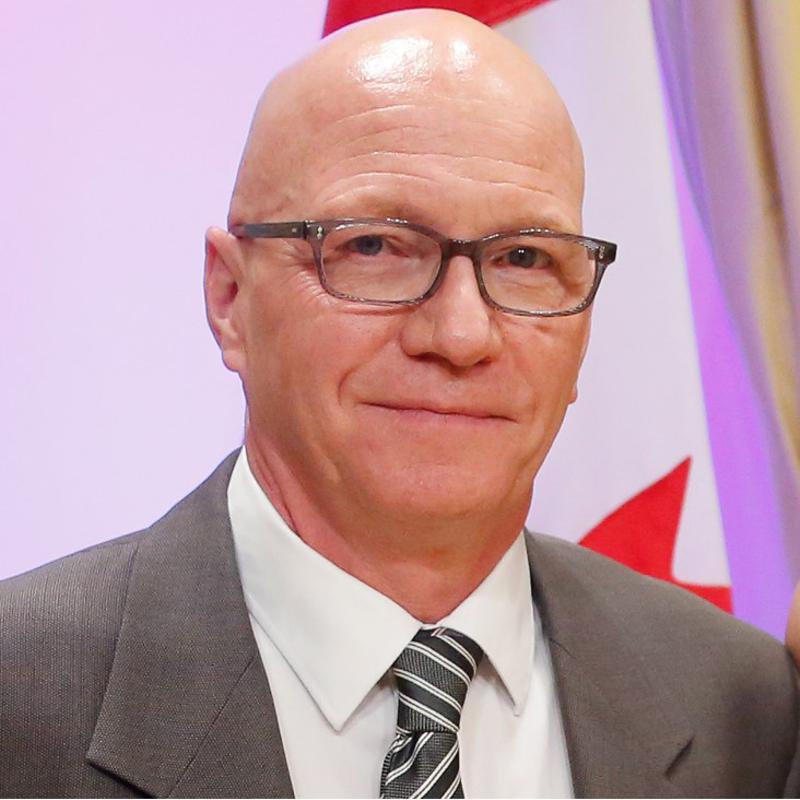
Brett McKay, David Slater and Charles Rusnell
Brett McKay is a journalist based in Edmonton. David Slater is a student journalist at MacEwan University. Charles Rusnell is an investigative journalist in Edmonton.

Four days before Alberta’s provincial election and an aggregate of polls is so far showing the United Conservative Party will win a tight race.
But pollsters were dead wrong in Alberta’s 2012 election. Alison Redford’s Progressive Conservative party won a handy majority over Danielle Smith’s upstart Wildrose Party despite a series of polls in the weeks before the election that predicted a Wildrose win.
If either party wins a tight race, they will probably need to put aside their partisan differences and try to collaborate on major policy initiatives, said Sarah Biggs, a political strategist and lobbyist who managed former UCP MLA Leela Aheer’s leadership campaign.
“No matter who wins on the 29th, they still have to remember that half of the province voted against them,” Biggs said.
“We are a two-party system and they are going to have to try to find some middle ground to not alienate more people, even more than we’re seeing right now.”
Biggs is one of four political observers interviewed by The Tyee. We asked them how either a UCP or NDP government would govern the province’s economy, education and health-care systems, and the environment.
Economy
As Andrew Nikiforuk recently observed, Alberta’s politicians don’t have the backbone to end the province’s economic dependence on oil. And so, once again, for both parties, expansion of the energy sector is the main platform for the economy.
Political analyst and campaign strategist Najib Jutt said there is little foresight by either party about where jobs will come from when the price of oil drops.
“In terms of energy, our two major political parties are two sides of the same coin, and that coin is owned by oil and gas corporations,” said Jutt, who is advising Alberta Green Party Leader Jordan Wilkie.
Though the UCP has promised to fight Trudeau’s Just Transition, a plan to shift Canada’s workforce into a clean-energy economy, the party has accepted the need for economic diversification and its economic plan includes industry incentives and municipal infrastructure investments.
As recently as 2020, former premier Jason Kenney said diversification is a luxury Alberta couldn’t afford. That has changed.
“They have finally started talking about diversification,” Biggs said with a laugh. “They finally accepted the word.”
The UCP issued a raft of incentives to attract big players from the film and television industry to the province, and Biggs expects those kinds of incentives will continue.
Similar schemes have been proposed by the UCP for forestry, agri-business and skilled trades, while the NDP plan includes incentives for diversification through tax credits for petrochemicals, clean tech, carbon and critical minerals and advanced manufacturing.
Robert Houle is a research fellow at the Yellowhead Institute, an Indigenous-led research and education centre at Toronto Metropolitan University. He anticipates an NDP government would bring back the green energy projects and other initiatives it introduced during its first term, including those aimed at increasing First Nations participation in the green economy.
Along with diversification, Mount Royal University political science professor Lori Williams said affordability is a key issue in Alberta’s economy. The UCP’s affordability payments don’t compensate for the financial burdens created by the elimination of rate caps for utility bills and auto insurance, she said.
“This puts them in a bit of an ambivalent place,” Williams said. “They seem to be out of touch with the experience of high costs for ordinary Albertans, because most Albertans aren’t experiencing the comfort and the surplus that the government is.”
Biggs also said the UCP will need to address the electricity and insurance caps, which the NDP have promised to restore.
Both the UCP and the NDP are on a spending spree, Biggs said, but whether they can deliver on their many promises depends on the price of oil since neither is willing to introduce a sales tax to buffer against a future bust.
Education
Education has been a hot-button topic in Alberta throughout the UCP reign as the party upended the province’s education system. The Kenney government sharply expanded fully funded charter schools, implemented cuts to staffing and imposed a new curriculum that 56 of 61 school boards refused to pilot because of its poor quality.
Political observers expect an NDP government to immediately begin the process of replacing the K-12 curriculum with the previous curriculum, which had been produced through an extensive process over a decade.
Jutt said if the UCP wins another mandate the party would likely see no reason to withdraw or redraft the curriculum. And he said a UCP government would likely expand the number of private and charter schools.
“You can always rely on a Conservative government to do what is best for the private industry,” he said.
Williams said the NDP are in a bit of a quandary over private and charter schools because they understand the need to allow some choice to appease a significant portion of the population, including religious groups.
“It is going to be a tricky balancing act for Rachel Notley,” she said. “Up until this point, even on private school funding, even though she has opposed that, she has allowed that to continue.”
Houle expects an NDP government would increase formal scrutiny of these private and charter schools to ensure they are not teaching problematic ideologies or excluding LGBTQ2S+ students.
The major difference between the parties, Williams said, is that the NDP have promised to hire 4,000 new teachers and about 3,000 educational assistants and support staff for a total investment of about $400 million.
In contrast, “the UCP’s proposals seem to be a little on the vague side,” Williams said.
The UCP also threw the province’s post-secondary education sector into turmoil with major cutbacks to universities while they increased funding for skills and trades training.
“They believe everything should be paid by the user and I think they will continue the cuts and push post-secondary to figure out other ways to fund themselves,” Jutt said.
Williams said the Notley government has talked about increasing spaces in universities, particularly for health-care workers to address the province’s chronic shortages.
Both parties have promised to freeze tuition at universities.
Health care
All four political observers expect both parties to continue the health-care policies they have advanced in the past.
Houle said the UCP, based on its previous record, will abandon its public health guarantees and continue the expansion of private for-profit health care.
During this election, the UCP has repeatedly denied it will implement health spending accounts and privatize hospital operations, both proposals that Smith mused about for years before she became the party’s leader.
Alberta has always had some degree of private health-care delivery, Jutt said. The question is whether the government covers the costs or patients pay out-of-pocket.
“The UCP wants us to pay out-of-pocket for everything,” Jutt said.
“They believe private is the best way to run things,” he said, adding however that “health care around the world has shown that health care that is publicly delivered has the best results and outcomes.”
A recent report from the Parkland Institute found outsourcing publicly funded surgeries to for-profit clinics in Alberta reduced surgery volumes and capacity in public hospitals.
In the short term, the NDP won’t have any option but to honour private contracts already in place, Williams said, “but I expect there will be an evolution to the kind of privatization that delivers more in the way of care at a lower cost.”
“We have shortages everywhere in terms of health-care professionals. So outsourcing is probably the only thing they can keep doing,” Jutt said. “It’s just a matter of who pays.”
The most direct and consequential thing that the NDP has committed to is being respectful with health-care workers, Williams said.
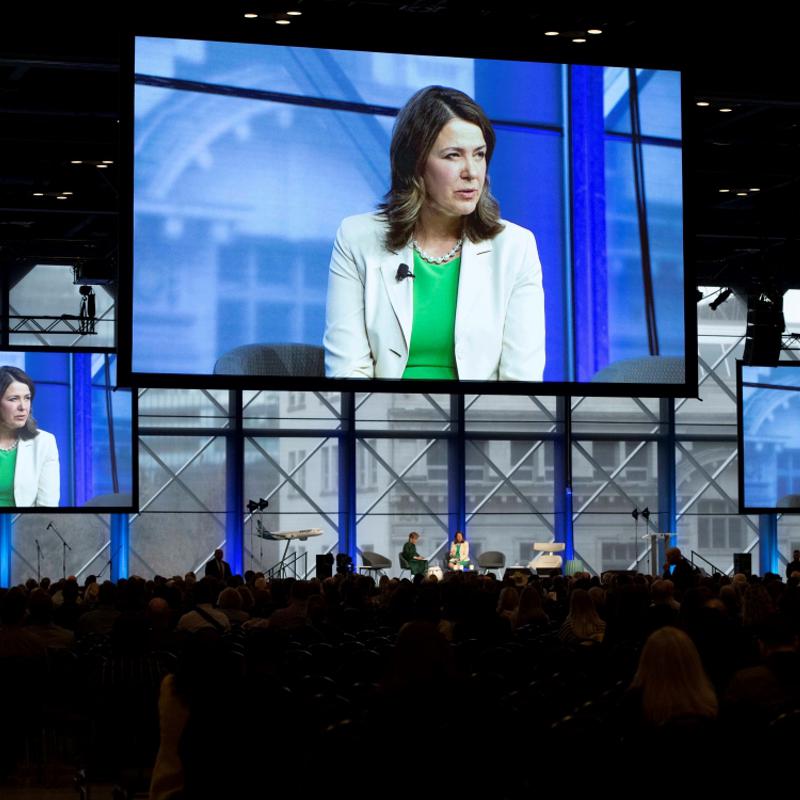
What’s at Stake for Alberta Voters? Just Democracy and the Rule of Law
“Under Jason Kenney, and Tyler Shandro in particular, there was a lot of damage that was done and we’re seeing the effects of that,” she said, referencing the high number of vacant family practitioner residencies in Alberta.
“It looks like docs are choosing not to stay in or come to Alberta to do family medicine because of something that is happening in Alberta.”
The NDP is making extensive, and expensive, promises about health care. But there is the same historical hitch — the price of oil.
“Everything that we can do in health care all depends on the revenue we are getting,” Biggs said.
“If we do not have the money to fix health care, then it won’t get done.”
Environment
UCP and NDP environmental policies will remain industry-friendly, despite the wildfires burning across the province.
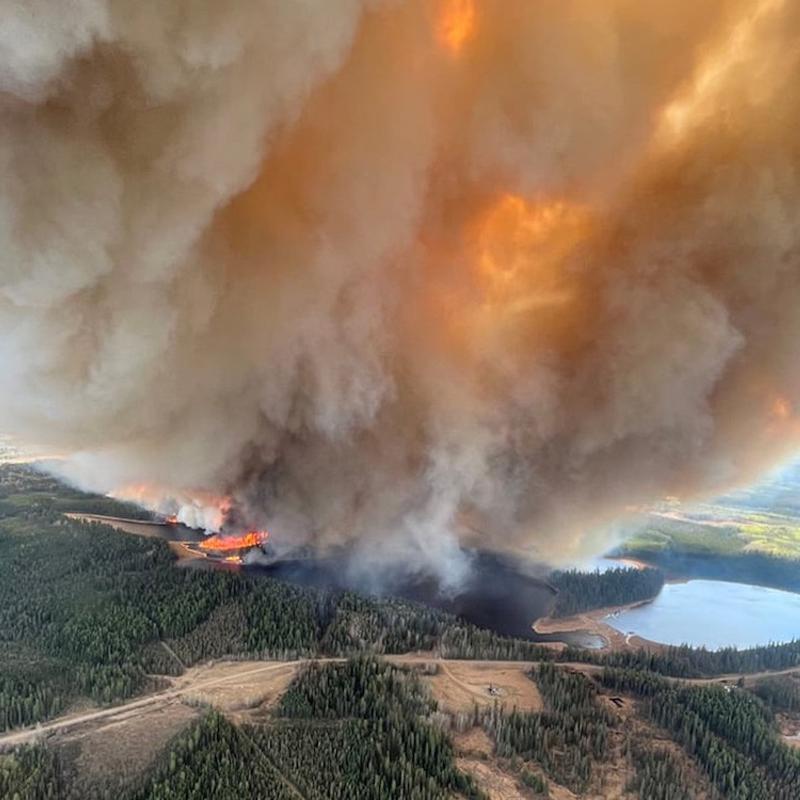
As Alberta Burns, Politicians ‘Dare Not Speak’ of Climate Change
Robert Houle said the UCP climate policy is status quo, and they will continue to spend public money fighting Ottawa on environmental policies needed to avoid future disasters.
The NDP, Houle said, “are still committed to continuing with the resource industry as it stands.”
Williams said the UCP will continue “being a champion of energy and the image at least of balancing energy and the environment will not be the emphasis by the looks of things so far.”
Jutt said UCP climate policy is laughable.
“Their net-zero goals are ridiculous,” he said, “They mean nothing.”
“All of the large corporations in oil and gas have net-zero targets, which mean nothing,” he said. “They have made no efforts to hit any of them.”
The UCP retained almost all of Notley’s climate action plan, Williams said.
The NDP knows climate action is a hard sell in Alberta, Jutt said. “That is why the NDP has moved further right on the portfolios of climate and energy.”

READ MORE: Politics, Alberta
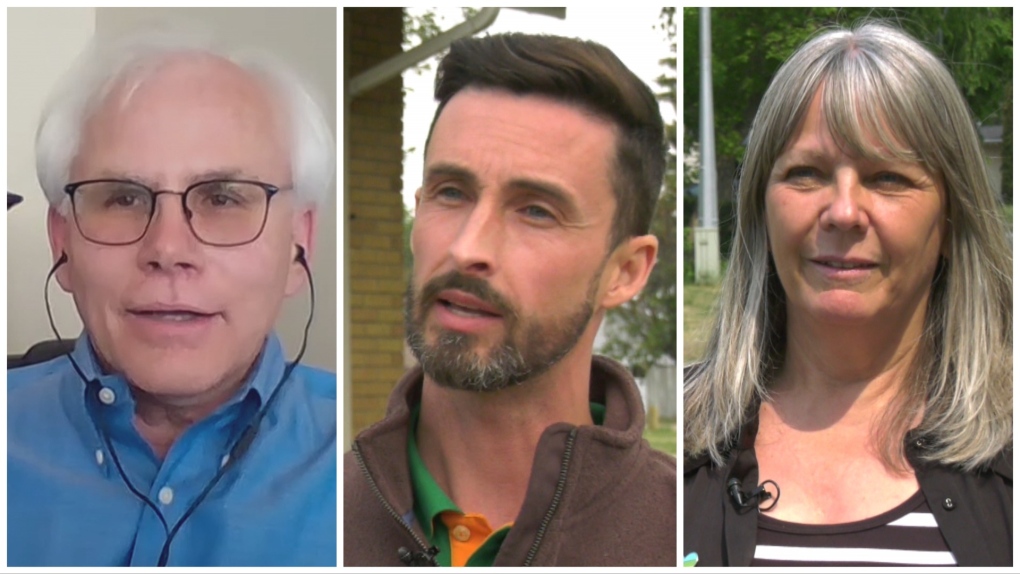
John Roggeveen of the Alberta Liberals, Jordan Wilkie of the Green Party and Sue Timanson of the Alberta Party in interviews with CTV News Edmonton.
Sean Amato
CTV News Edmonton
Published May 25, 2023
Voters who have had enough of Alberta's two-party legislature will have other options in most ridings this election, but it appears highly unlikely that any other party will grab a seat.
The province is in line for more of the same with the UCP versus the NDP, according to political analysts and several polls predicting a two-way race when votes are counted Monday.
"In the last couple of weeks, and this has shown up in the polling, is the support for the third and fourth and fifth parties has literally just evaporated," analyst and commentator John Brennan told CTV News Edmonton, referencing a recent Abacus Data poll.
"The Alberta Party is now down to two per cent, the Liberal is at one per cent and the Greens even less than that."
RELATED STORIES
An Angus Reid poll done earlier this month found all other parties combined at just six per cent among decided voters, with the Alberta Party a distant third at three per cent.
The UCP and NDP are the only parties with a full slate of 87 candidates and those are the only options in eight ridings
While both reported revenue of more than $7 million last year, third-place Pro-Life Alberta reported roughly $327,000. The Green Party, for example, reported just $17,000.
Still, candidates not dressed in blue or orange are out there knocking on doors.
'IT'S DIFFICULT TO GET PEOPLE TO RUN'
Gaining support, candidates and money is not easy right now, allowed the leader of the Alberta Liberals.
"Quite often people hear the name Liberal and they close us off," John Roggeveen told CTV News Edmonton.
His party has just 13 candidates.
"It's difficult to get people to run when your party is so far down in the polls," Roggeveen said.
The Liberal bank account is also running low. The party raised about $100,000 in 2022 and its leader said they have about two or three per cent as much as the big parties.
He acknowledged that he and NDP Leader Rachel Notley are like-minded on many things.
"I would say that our policies are closer to the NDP than they are to the UCP. We have a lot of overlaps with their policies, or frankly, they overlap with us in a lot of ways," Roggeveen said.
Still, he feels Liberal voices in the legislature would help "tone the rhetoric down" and lead to better government for Albertans.
The Liberal platform includes supporting the federal Liberals "just transition" plan to create jobs for oil and gas workers, building more affordable housing and maintaining the Canada Pension Plan in Alberta.
Former Liberal Leader Dr. David Swann endorsed Rachel Notley and the NDP Thursday.
'WE JUST SEE BICKERING GOING BACK AND FORTH'
The Green Party agrees with Roggeveen that the legislature needs more diversity.
It is running 41 candidates, third most in Alberta.
Leader Jordan Wilkie, who is on the ballot in Edmonton-Rutherford, said his party needs to get a seat on Monday in order to increase "accountability" and "collaboration" in the province's political scene.
"People are really starting to wake up to the idea that these third parties are important, that we can break up a two-party system and that we can represent Albertans better," he told CTV News Edmonton.
"The debate sure didn't help these two parties [UCP and NDP], when we just see bickering going back and forth without real solutions or really listening to what Albertans want and need. Ever since the debate, I've had a lot more support."
Wilkie acknowledged his party cares very much about cleaning up the environment but pointed out that it will do no good if people no longer have jobs and can't afford food.
The Green Party platform includes policies on wildfire management, electoral reform and cleaning up oil and gas wells to "create 10,000 jobs per year."
'WE KNOW WE'RE NOT GOING TO FORM GOVERNMENT'
The Alberta Party has 19 candidates on the ballot.
The party was swept out of the legislature in 2019 after going into that election with three seats.
Sherwood Park candidate Sue Timanson said she's not worried about her party winning the election and she tells people that when she knocks on doors.
Her pitch to voters is to help her get a seat so she can fight for her constituents.
"We know we're not going to form government. It takes the pressure off the expectation that that's what we're going to do," Timanson said.
"And again, puts it back onto what the job of an MLA is and I can do, and I can probably do better as an Alberta Party MLA than a backbencher on the other parties, who are restricted in what they can say and what they can do. I'm not."
Timanson said she was disappointed the party was not able to attract more candidates.
"We worked really hard to up that number, but we're in a really challenging political climate right now," she explained.
"We had a lot of people that, although they were interested, were not willing to put themselves out there, which is too bad. They were worried about some consequences if they put themselves out for a party that wasn't one of the big two."
Timanson described her team as socially progressive and fiscally responsible.
She said many people have thanked her for running and providing voters another option.
The Alberta Party platform promises to freeze funding for private and charter schools, directly fund mental health counselling and reduce the province's reliance on oil and gas revenues.
The Solidarity Movement, Wildrose Loyalty Coalition, Alberta Independence, Advantage Party, Communist, Wildrose Independence, Reform, Buffalo and Pro-Life parties are also running at least one candidate.
There are 22 independent candidates also on ballots across Alberta.
With files from CTV News Edmonton's Amanda Anderson







